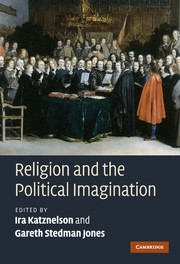Book contents
- Frontmatter
- Contents
- List of contributors
- Acknowledgements
- Introduction: multiple secularities
- 1 Secularisation: religion and the roots of innovation in the political sphere
- 2 Regarding toleration and liberalism: considerations from the Anglo-Jewish experience
- 3 The Enlightenment, the late eighteenth-century revolutions and their aftermath: the ‘secularising’ implications of Protestantism?
- 4 In the lands of the Ottomans: religion and politics
- 5 The Russian Orthodox Church and secularisation
- 6 The American experience of secularisation
- 7 French Catholic political thought from the deconfessionalisation of the state to the recognition of religious freedom
- 8 Religion and the origins of socialism
- 9 From 1848 to Christian Democracy
- 10 The disciplining of the religious conscience in nineteenth-century British politics
- 11 Colonial secularism and Islamism in North India: a relationship of creativity
- 12 The 1960s
- 13 Gendering secularisation: locating women in the transformation of British Christianity in the 1960s
- 14 Does constitutionalisation lead to secularisation?
- 15 Europe's uneasy marriage of secularism and Christianity since 1945 and the challenge of contemporary religious pluralism
- 16 On thick and thin religion: some critical reflections on secularisation theory
- Index
3 - The Enlightenment, the late eighteenth-century revolutions and their aftermath: the ‘secularising’ implications of Protestantism?
Published online by Cambridge University Press: 05 June 2012
- Frontmatter
- Contents
- List of contributors
- Acknowledgements
- Introduction: multiple secularities
- 1 Secularisation: religion and the roots of innovation in the political sphere
- 2 Regarding toleration and liberalism: considerations from the Anglo-Jewish experience
- 3 The Enlightenment, the late eighteenth-century revolutions and their aftermath: the ‘secularising’ implications of Protestantism?
- 4 In the lands of the Ottomans: religion and politics
- 5 The Russian Orthodox Church and secularisation
- 6 The American experience of secularisation
- 7 French Catholic political thought from the deconfessionalisation of the state to the recognition of religious freedom
- 8 Religion and the origins of socialism
- 9 From 1848 to Christian Democracy
- 10 The disciplining of the religious conscience in nineteenth-century British politics
- 11 Colonial secularism and Islamism in North India: a relationship of creativity
- 12 The 1960s
- 13 Gendering secularisation: locating women in the transformation of British Christianity in the 1960s
- 14 Does constitutionalisation lead to secularisation?
- 15 Europe's uneasy marriage of secularism and Christianity since 1945 and the challenge of contemporary religious pluralism
- 16 On thick and thin religion: some critical reflections on secularisation theory
- Index
Summary
The word ‘secular’ originally distinguished parochial clergy from those in religious orders; more generally it distinguished civil political power from that of the church. ‘Secularisation’ was used to describe the appropriation of church property by the (secular) state, for example, Henry VIII's dissolution of the monasteries in England. The word therefore presumes opposition. As scientific methods of inquiry became more sophisticated from the seventeenth to the nineteenth century, thinkers began to wonder whether such methods were applicable to human beings themselves; several of the founding fathers of sociology and social anthropology posited their theories in deliberate opposition to religion. Just as Christians had in earlier centuries treated pagan beliefs as superstitions, so from the Enlightenment Christian beliefs in their turn were regarded as superstitious. The scientific study of humanity was thus originally a deliberately anti-religious, or more precisely anti-Christian, programme. Karl Marx is but one example. To the extent that Protestant approaches to Christianity had dismissed aspects of Catholicism as superstition and also sought to adjust Christian belief to new scientific discoveries, Protestants may be regarded as ‘covert’ secularisers.
It is not necessary here to enter into the debate about the relationship between the rise of modern science and the development of industrial capitalism in western Europe. But at least since Max Weber sociologists have linked Protestantism and the rise of capitalism.
- Type
- Chapter
- Information
- Religion and the Political Imagination , pp. 70 - 89Publisher: Cambridge University PressPrint publication year: 2010
- 1
- Cited by

